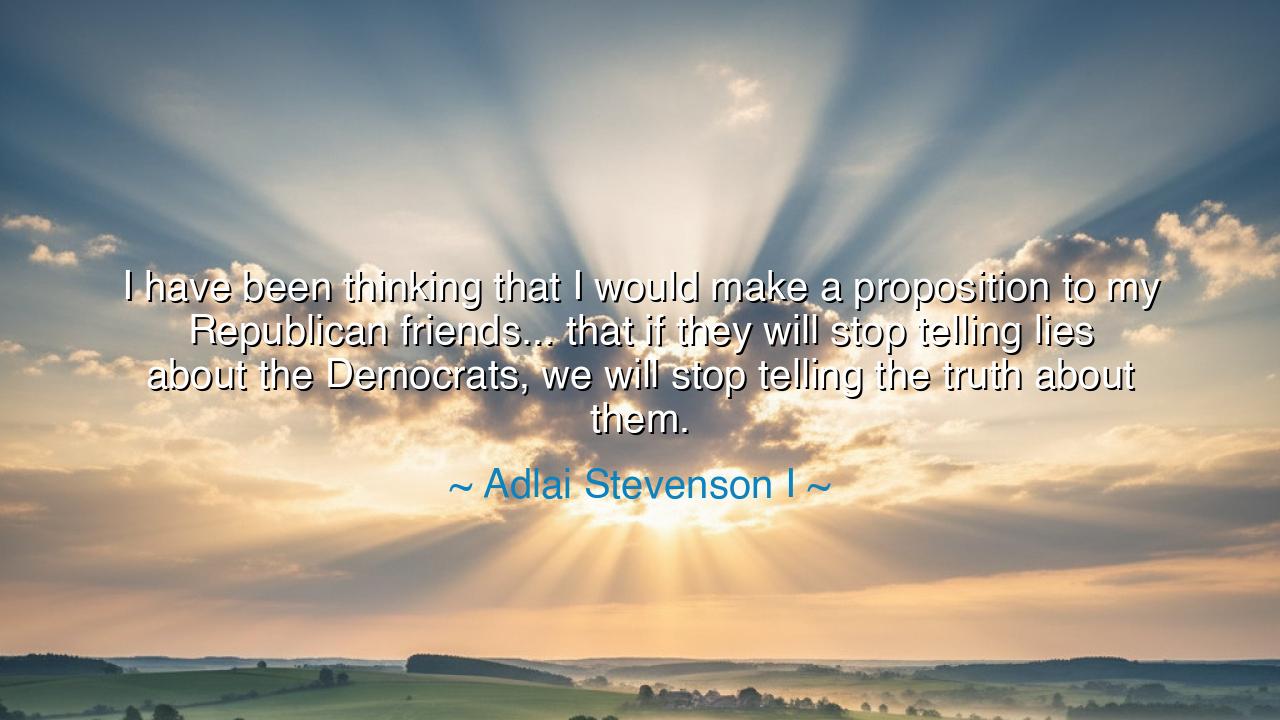
I have been thinking that I would make a proposition to my
I have been thinking that I would make a proposition to my Republican friends... that if they will stop telling lies about the Democrats, we will stop telling the truth about them.






The words of Adlai Stevenson I — “I have been thinking that I would make a proposition to my Republican friends... that if they will stop telling lies about the Democrats, we will stop telling the truth about them.” — are spoken with wit, yet beneath their laughter lies the sharp edge of wisdom. They reveal that in the clash of parties, the battle is not always one of vision or principle, but often one of lies and distortions. Stevenson, with tongue both playful and piercing, reminds us that in politics, truth itself can be more dangerous to one side than the boldest fiction.
This saying emerged in the fiery contests of American democracy, where Republicans and Democrats struggled endlessly for the hearts of the people. Stevenson, a master of rhetoric, wielded humor as a weapon sharper than steel. By equating the lies of one side with the truth of the other, he unveiled the fragility of power built on falsehoods. His jest carried a sting: that the mere speaking of truth was enough to wound those who thrived on deception.
History offers a mirror to this lesson. Recall the downfall of Richard Nixon in the wake of Watergate. The lies woven to conceal corruption were vast, but in the end, it was not the lies that destroyed him, but the truth revealed. Investigators and journalists peeled back the veil, and what was uncovered brought the mighty low. In that moment, Stevenson’s wit seemed prophecy: the truth about the powerful can be their undoing, while lies may serve only as frail armor delaying the inevitable.
The deeper meaning of Stevenson’s jest is this: politics is not only a struggle of ideologies, but a war of narratives. One side may conjure lies to paint the other in shadow, but when the other side wields truth as its weapon, the blow is often mortal. The laughter in Stevenson’s words is the laughter of one who sees beyond the surface, who knows that time itself is the great ally of truth, and the great enemy of lies.
Let those who come after remember: the tongue may cloak itself in lies, but it is the truth that endures like iron. In the contests of men and parties, wit may win the moment, but honesty wins the age. And so Stevenson teaches us through jest: guard your honor, for the truth spoken against you may weigh more heavily than the fiercest accusation born of falsehood.






TTNguyen Thuy Tien
Adlai Stevenson’s statement is a biting commentary on the current state of politics, but does it reflect a solution or just exacerbate the problem? By trading lies and truths, do we risk losing sight of the core issues that need addressing? What would it look like if both parties agreed to stop the game of manipulation and focused on truth and transparency? Could we finally see a shift toward more constructive politics?
LTChiem Ly Thi
This quote feels almost cynical, but it also highlights the frustration many people feel about the state of politics today. If both sides are using misinformation as a weapon, where does that leave the truth? Is this kind of approach really effective in fostering trust or just further damaging the relationship between the parties and the public? How can we find a way to have more productive, less combative political discourse?
MSmikey Sanno
Stevenson’s quote makes me reflect on how political parties often devolve into mud-slinging rather than focusing on real issues. Does it make sense to play the same game of deception in response to lies? Or should we elevate the conversation, even if one side is engaging in dishonesty? Could this kind of 'proposition' just contribute to a cycle of negativity that further divides the country?
BCBao Chi
This quote feels like a clever but pointed jab at the state of politics, highlighting how both parties can fall into the trap of misinformation. But does this create a more toxic environment where truth is manipulated just to get back at the other side? Shouldn’t politics be about representing the best interests of the people, rather than playing a game of 'truth' vs. 'lies'? How do we move beyond this kind of rhetoric?
UGUser Google
Adlai Stevenson’s quote captures the sharp division in political discourse today. It suggests a kind of tit-for-tat approach between parties, but is this really the best way forward? What does this kind of strategy do to the integrity of political conversation? Maybe we should be striving for more honesty and less partisan bickering. Could this quote be a reflection of just how far political discourse has fallen from meaningful debate?